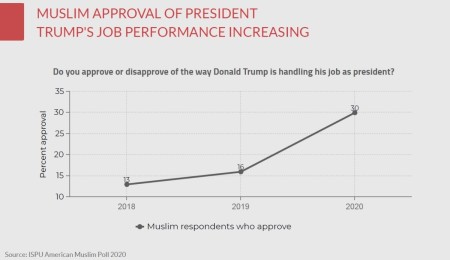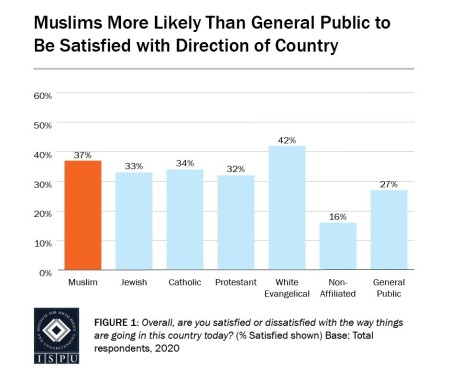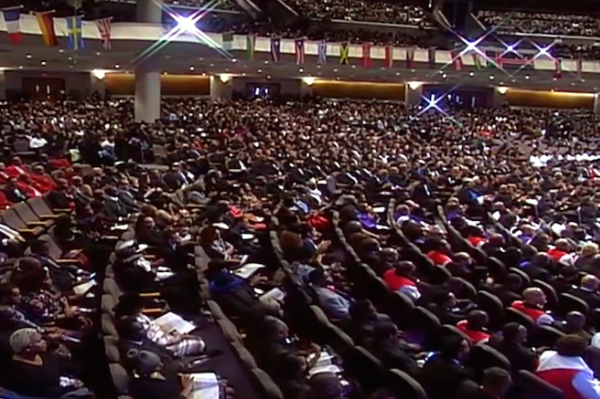Muslim approval of Trump is growing but will they vote for him?
“Do you think Islam is at war with the West?” Anderson Cooper asked then-candidate Donald Trump in March 2016.
"I think Islam hates us,” Trump replied.
He continued: “There’s a tremendous hatred, and we have to get to the bottom of it. We have to be very vigilant, we have to be very careful, and we can’t allow people coming into this country who have this hatred of the United States and of people who aren’t Muslim.”
Less than a year later, President-elect Trump placed significant travel restrictions on foreign nationals from seven predominantly Muslim countries, now widely referred to as the “Muslim ban.” Trump later expanded the ban to 13 countries in January 2020.
Former Vice President Joe Biden has promised to repeal the ban on day one of his presidency should he defeat Trump in November. “Under this administration, we’ve seen an unconscionable rise in Islamophobia,” Biden said in a speech to Emgage Action, an advocacy group for Muslim Americans. Biden’s agenda for Muslim American communities also includes protecting their constitutional and civil rights, honoring their diversity and contributions, and creating a safe environment in school, where Muslim students are twice as likely to be bullied.
Given this backdrop, it would seem the choice in 2020 is clear for Muslims. Or is it?
Last week, the Institute for Social Policy and Understanding reported findings from their 2020 Muslim Poll, which surveyed Muslims, Jews, White evangelicals, and the general public in March and April as COVID-19 cases spiked and the country began shutting down.
The nationally-representative survey, completed by over 800 Muslim adults and 2,000 people in total, provides a snapshot of the attitudes and perceptions of the American public during this unprecedented moment in American history. Of special focus in the study is the impact of four years of a Trump presidency on underrepresented religious minorities such as American Muslims and Jews, including their approval of Trump’s job performance and their overall satisfaction with the direction of the country.
When ISPU asked Muslims in 2017 if they favored a Trump presidency, only 15% agreed. Conversely, a slight majority of Muslims favored a Clinton victory, trailing only American Jews in their wish to see the Democratic candidate for president take office. Since then, ISPU found that Muslim approval of President Trump’s job performance has increased 17% in the last three years, from 13% in 2018, to 16% in 2019, to 30% in 2020.

The 2020 poll also found that Muslims were 10% more likely than the general public to be satisfied with the direction of the country (37%, compared to 27% of the general public) as pandemic shut-downs began. Only White evangelicals, of which 81% voted for President Trump in 2016, were found to be more satisfied than Muslims (42%).
To be sure, Trump’s job performance may or may not be the reason why Muslims trail just 5% behind White evangelicals in their satisfaction in the country’s direction. Notably, Muslims continue to report strong pride in being American despite their reservations about Trump. Muslims have also cited Trump’s economic policies, toughness on terrorism, and enthusiasm about Middle East peace talks as reasons for supporting his presidency. Nevertheless, this is a surprising finding given that the Muslim ban has grown increasingly unpopular, and Trump has been blamed for sharp increases in anti-Muslim sentiment during his tenure as President.

Why is Trump, who has been called an “Islamophobic bigot,” seeing a growth in approval ratings among Muslims?
ISPU researchers cite two major theories for the growth.
First, the researchers believe the increase is partially driven by White Muslims being more likely than non-White Muslims to vote for Trump, citing that nearly one third of White Muslims (31%) intend to vote for Trump in 2020 compared to just 8% of Black and Arab Muslims and 6% of Asian Muslims. Trump continues to posture himself as the defender of White America, and it seems some White Muslims are catching on.
Interestingly, ISPU found that White Muslims are most likely to report “regularly” experiencing religious discrimination, compared to just 8–12% of non-white Muslims. Other studies have found that White Americans believe they face discrimination in America, while White evangelicals have suggested they face more discrimination than Muslims. It may be that as Trump pushes the narrative of perceived racism against Whites, some White Muslims feel seen and heard. It may be also be the case that White Muslims face more discrimination because they are perceived as race traitors.
Second, ISPU researchers suggest that Trump’s growing approval rating among Muslims could be attributed to the time period when the survey was administered: March 2020. This is when schools and states were rapidly shutting down and when the Trump administration seemed to show the most urgency toward the virus. This “rally around the flag” effect, popularized by political scientists, is when the public senses a national crisis is on the horizon and begins to rally, at least temporarily, around their national leaders. During this period, the public becomes less critical of government policies and more approving of their leaders. When the Trump administration told the public, “We’re all in this together,” this call for unity may have resulted in increased approval ratings among Democrats and Independents.
A third reason for the growth in Muslim approval of Trump is not specifically named in the report, but could be derived from other findings in the report. ISPU found that nearly half of Muslims are supportive of building coalitions with political conservatives on religious liberty issues (49%, compared to 35% of the general public) and pro-life groups (47%, compared to 30% of the general public). White Muslims, once again, were more likely than Muslims of color to support the building of these coalitions, suggesting that their support for these coalitions may be alluring to their racial identity in some respect. In their sympathy to Trump, White Muslims may feel some camaraderie with him as he appoints pro-life judges and carries out a politically conservative vision for religious freedom. Recently, some have argued that Muslims and evangelicals have more in common, socially and politically, than they realize.
The question remains: Though Muslim approval has grown toward President Trump, will this translate to more Muslim votes for Trump on November 3? Notably, only 14% of Muslims reported that they intend to vote for Trump – just half of 30% who said they approved of Trump’s job performance – while a little more than half said they intended to vote for Bernie Sanders (29%, before he dropped out) or Joe Biden (22%). There may be a silver lining, however: 28% reported that they were undecided.
Could this undecided group of Muslims contain some Trump voters? Potentially, through unlikely.
When ISPU surveyed Muslims in 2017, a substantial percentage (roughly 30%) did not favor either of the two major party candidates. Due to widespread dissatisfaction with the options presented to them, American Muslims were the least likely group in ISPU’s survey to vote (61%) or be registered to vote (68%) in 2016. Granted, this could change, given that Biden has done more outreach to the Muslim community than Hillary Clinton did. Even so, it must be noted that although Muslim approval of Trump’s job performance is growing, their approval rating is still lower than other groups surveyed (30% of Muslims vs. 44% of Catholics, 46% of Protestants, 70% of white Evangelicals, and 39% of the general public). With this in mind, it is reasonable to suspect that we won’t see an outpouring of Muslim voters for Trump in November.
Nevertheless, this trend deserves further attention and study. Many have noted that Islamophobia is not just an issue on the right, but also an issue on the left. In September, MSNBC host Joy Reid compared President Donald Trump’s seeming support for those committing violence at protests to “the way Muslims act,” drawing fire from both sides of the aisle. Muslims are taking notice. Furthermore, many forget that 70% of Muslims voted for George W. Bush in 2000, suggesting that Muslims continuing to vote Democrat in large numbers is not a forgone conclusion. Whether Trump and Republicans will take this seriously, however, is another question entirely. So far, it seems that political conservatives aren’t interested in the Muslim vote; but with every vote on the line, who knows what awaits us going into what some are calling the most important election, ever.
Kevin Singer (@kevinsinger0) is Co-Founder and Director of Neighborly Faith, a national campus-based organization drawing thousands of Christians and Muslims across America into friendship, a freelance journalist focused on issues related to religion and politics, and a religious studies professor at two community colleges.





















